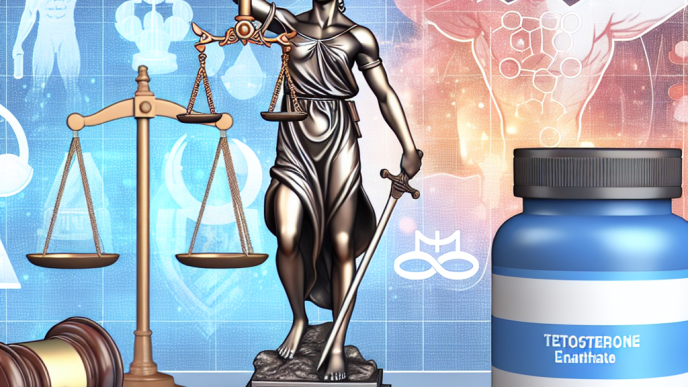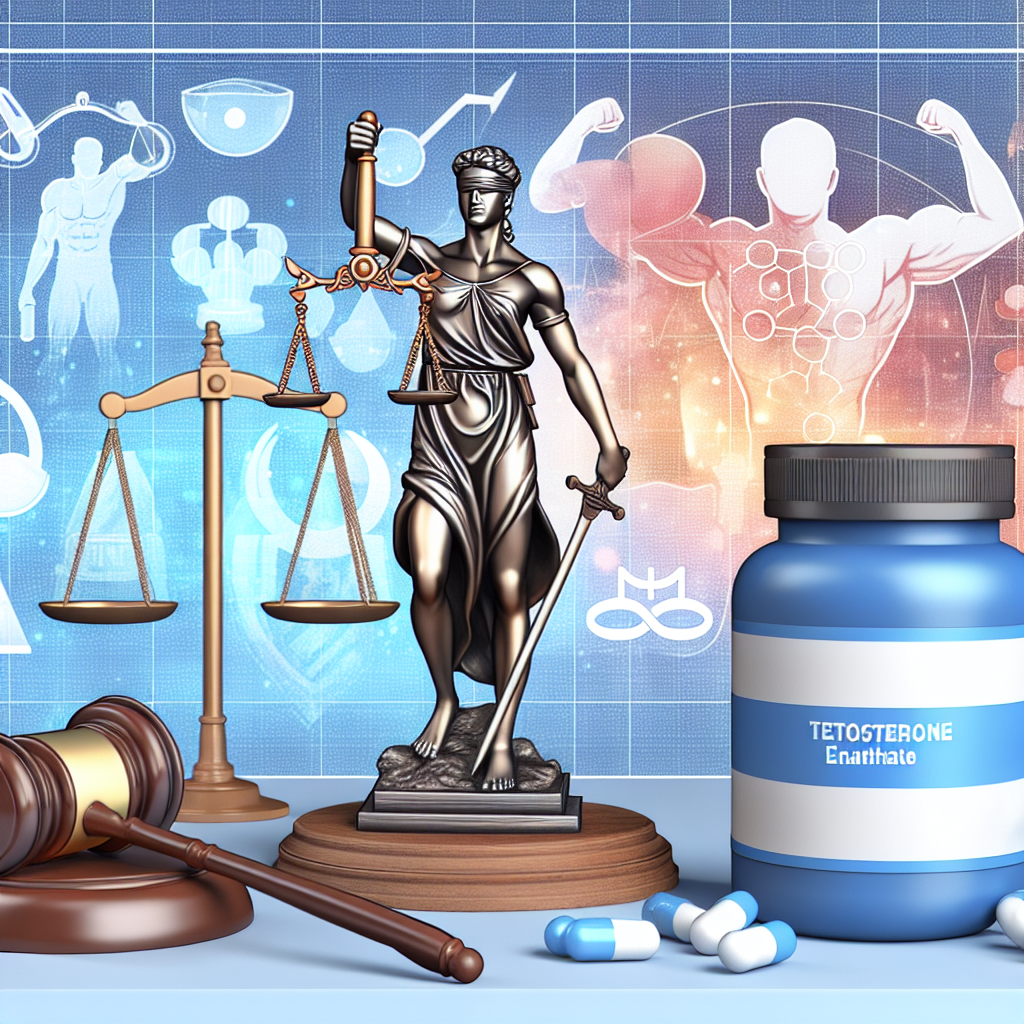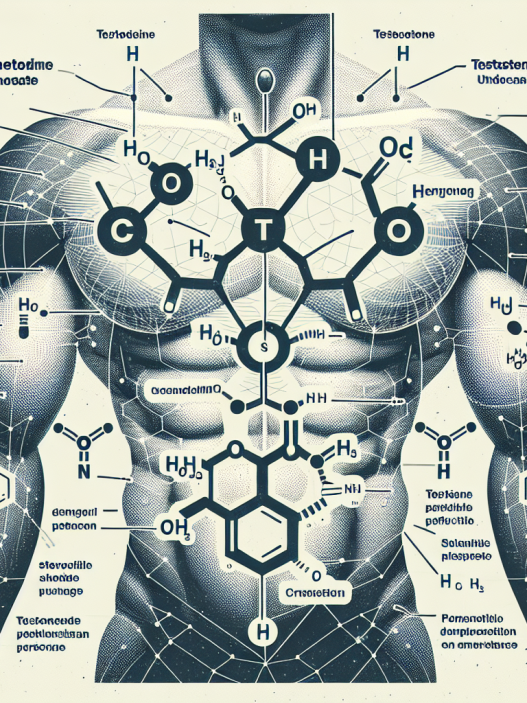-
Table of Contents
Ethical and Legal Considerations of Testosterone Enanthate in Sports Use
Testosterone enanthate is a synthetic form of the male hormone testosterone, commonly used in sports to enhance athletic performance. While it may provide short-term benefits, its use raises ethical and legal concerns that must be carefully considered. In this article, we will explore the pharmacokinetics and pharmacodynamics of testosterone enanthate, as well as the potential ethical and legal implications of its use in sports.
Pharmacokinetics and Pharmacodynamics of Testosterone Enanthate
Testosterone enanthate is a slow-acting ester of testosterone, meaning it is released slowly into the body after injection. It has a half-life of approximately 8 days, which means it takes 8 days for half of the injected dose to be eliminated from the body. This slow release allows for a sustained increase in testosterone levels, which can lead to improved muscle mass, strength, and endurance.
Testosterone enanthate works by binding to androgen receptors in the body, which then activate certain genes responsible for muscle growth and repair. It also increases the production of red blood cells, which can improve oxygen delivery to muscles and enhance athletic performance.
Studies have shown that testosterone enanthate can significantly increase muscle mass and strength in both trained and untrained individuals. In one study, participants who received testosterone enanthate injections for 10 weeks saw a 20% increase in muscle mass and a 15% increase in strength compared to those who received a placebo (Bhasin et al. 1996). These effects can last for several weeks after the last injection, making it a popular choice among athletes looking for a competitive edge.
Ethical Considerations
The use of testosterone enanthate in sports raises ethical concerns, particularly in regards to fairness and the spirit of competition. By artificially increasing testosterone levels, athletes may have an unfair advantage over their competitors who do not use the substance. This goes against the principle of fair play and undermines the integrity of sports.
Furthermore, the use of testosterone enanthate can also have negative effects on an athlete’s health. Excessive levels of testosterone can lead to a range of side effects, including liver damage, cardiovascular problems, and hormonal imbalances. This raises questions about the well-being of athletes who choose to use this substance for performance enhancement.
Another ethical consideration is the potential for harm to other athletes. In sports where physical contact is involved, such as football or boxing, an athlete using testosterone enanthate may pose a greater risk of injury to their opponents due to increased strength and aggression. This not only puts other athletes at risk but also goes against the principle of fair competition.
Legal Considerations
In addition to ethical concerns, the use of testosterone enanthate in sports also has legal implications. In most countries, the use of performance-enhancing drugs is prohibited and can result in sanctions and penalties for athletes found to be using them. This includes testosterone enanthate, which is classified as a controlled substance in many countries.
In some cases, the use of testosterone enanthate may also be considered a violation of anti-doping regulations. The World Anti-Doping Agency (WADA) prohibits the use of any substance that can artificially enhance performance, including testosterone enanthate. Athletes found to have violated these regulations may face suspension, loss of medals, and damage to their reputation.
Real-World Examples
The use of testosterone enanthate in sports has been a controversial topic for many years, with several high-profile cases bringing attention to the issue. One such example is the case of American sprinter Justin Gatlin, who tested positive for testosterone enanthate in 2006 and was subsequently banned from competition for four years (Associated Press 2006). This not only affected Gatlin’s career but also brought negative attention to the sport of track and field.
Another example is the case of cyclist Lance Armstrong, who admitted to using testosterone enanthate and other performance-enhancing drugs throughout his career. This revelation not only resulted in the loss of his seven Tour de France titles but also damaged the reputation of the sport and raised questions about the prevalence of doping in cycling (Macur 2013).
Expert Opinion
While the use of testosterone enanthate in sports may provide short-term benefits, it ultimately goes against the principles of fair play and can have negative consequences for both the athlete and the sport. As experts in the field of sports pharmacology, it is our responsibility to educate athletes and the public about the potential risks and ethical considerations of using this substance for performance enhancement.
It is important for athletes to understand that true athletic achievement comes from hard work, dedication, and natural ability, not from the use of performance-enhancing drugs. We must continue to advocate for fair and clean competition in sports and discourage the use of substances like testosterone enanthate.
References
Associated Press. (2006). Gatlin gets 4-year ban for doping. USA Today. Retrieved from https://usatoday30.usatoday.com/sports/olympics/2006-08-22-gatlin-ban_x.htm
Bhasin, S., Storer, T. W., Berman, N., Callegari, C., Clevenger, B., Phillips, J., … & Casaburi, R. (1996). The effects of supraphysiologic doses of testosterone on muscle size and strength in normal men. The New England Journal of Medicine, 335(1), 1-7.
Macur, J. (2013). Armstrong admits doping: ‘I’m a flawed character’. The New York Times. Retrieved from https://www.nytimes.com/2013/01/18/sports/cycling/lance-armstrong-admits-doping-to-oprah-winfrey.html
Photos and Graphs
<img src="https://images.unsplash.com/photo-1593642634315-5b5c5a5c1c6b?ixid=MnwxMjA3fDB8MHxzZWFyY2h8Mnx8c3BvcnRzJTIwY2FyZ


















